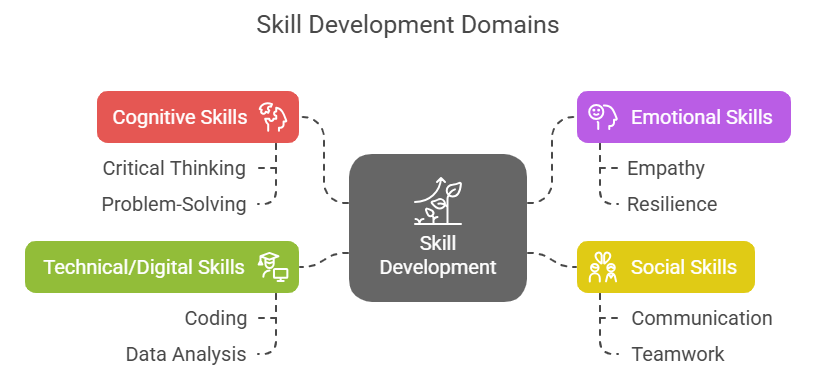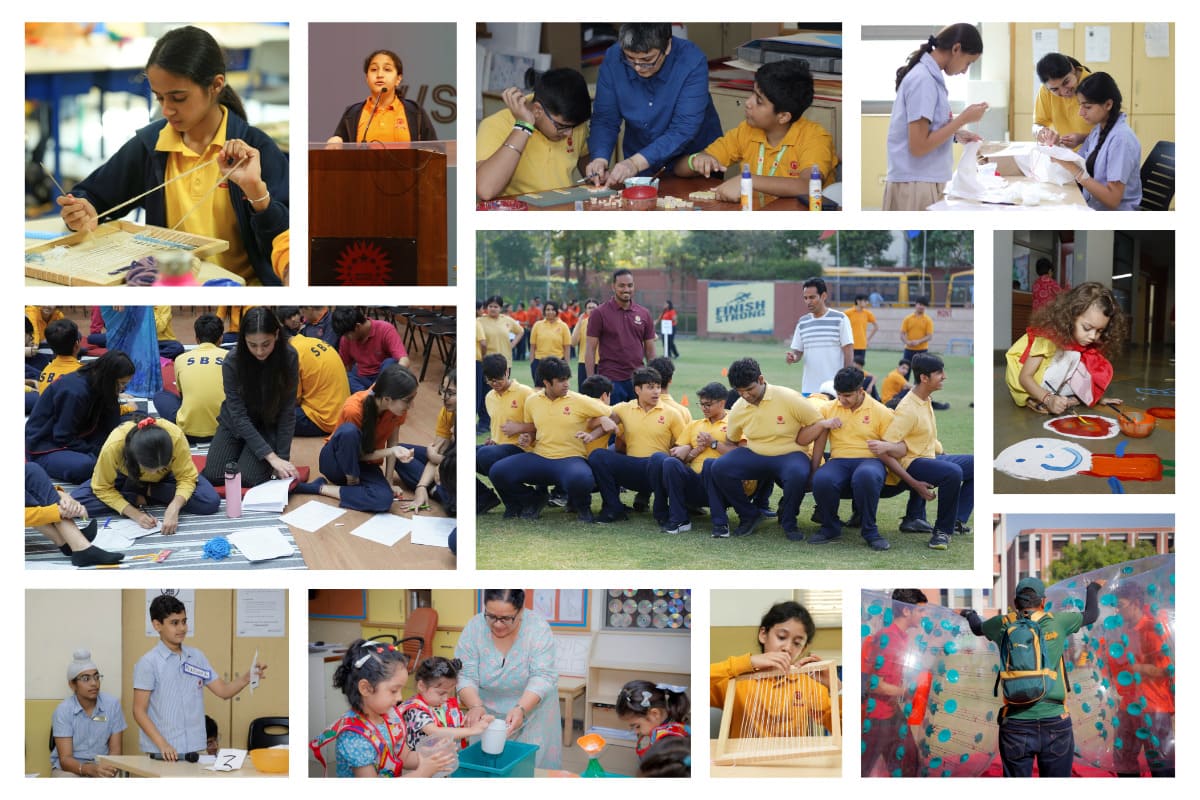9 May, 2025
In 2025, the role of schools has evolved far beyond academic instruction. Across the globe, there is a growing realization that academic achievement alone is not enough. The real challenge lies in preparing students for a rapidly changing world. This is where skill development becomes essential. Whether in a local school or an international institution, integrating skill-based learning is no longer optional—it’s vital for survival and success in the 21st century.

The Shift from Rote Learning to Real-World Readiness
The education trends are now shifting towards skill-based learning. Schools are rethinking curriculums to include life skills, communication, collaboration, problem-solving, and adaptability.
Skill development spans several domains: cognitive skills (like critical thinking and problem-solving), emotional skills (such as empathy and resilience), social skills (communication and teamwork), and technical or digital skills (like coding or data analysis). Recognizing these categories helps schools and parents focus on well-rounded growth.
Benefits of Skill Development for Students:
Global Demand for 21st-Century Skills
Across continents, employers now prioritize skills over degrees. As per recent global reports, skills like critical thinking, digital literacy, emotional intelligence, and creativity top the list of hiring criteria. This global shift has led to changes even in school jobs, where educators are now expected to act more like facilitators than lecturers.
Ahonen and Kinnunen (2015) investigated how students perceive the value of twenty-first-century skills, such as critical thinking, collaboration, and problem-solving, in relation to traditional academic content. The study revealed that students increasingly recognize these skills as crucial for real-world success and lifelong learning. The findings suggest that education systems need to move beyond rote learning and integrate skill-based approaches to better prepare learners for the dynamic demands of modern society. This shift reflects a global trend in prioritizing practical, transferable competencies over purely academic achievement.
In India, the National Education Policy (NEP) 2020 echoes this global vision by emphasizing the integration of skill development from the foundational stage. To ensure effectiveness, this development must be age appropriate. In the early years, the focus is on nurturing emotional intelligence and social cooperation. Middle school students are introduced to leadership opportunities, digital fluency, and independent thinking. By the time students reach secondary school, the emphasis shifts to mastering advanced cognitive skills, collaborative problem-solving, and industry-specific capabilities through hands-on projects and real-world challenges.
Blending Academics with Practical Learning
Globally, IB schools are leading this movement through structured programmes like Theory of Knowledge (TOK) and Creativity, Activity, Service (CAS). TOK encourages students to question how knowledge is formed, while CAS enables them to engage in real-world experiences that foster empathy, resilience, and leadership.
CBSE schools, too, are evolving to include more experiential and competency-based learning. The recent focus on project work, integrated assessments, and skill development aligns with NEP 2020’s vision of holistic education. Many CBSE schools are actively encouraging interdisciplinary approaches and real-life application of knowledge, aiming to equip students with both academic depth and practical insight.
Similarly, IGCSE schools are integrating practical applications through coursework, global perspectives, and critical thinking modules, helping students apply concepts to real-world contexts and current issues.
Assessments, too, are evolving. Schools in India and abroad are embracing project-based evaluations, peer feedback, and digital portfolios, making learning more personalized, reflective, and skill-driven .
The Role of Educators in a Skill-Based Ecosystem
For a skill-based education system to truly thrive, the role of the educator must continuously evolve. Today, there is a growing demand for trained professionals who can effectively teach both content and context—blending subject knowledge with real-world application. As schools, including every special education needs school, adapt to these changing requirements, there’s been a noticeable rise in teacher vacancy in School. Hiring trends now emphasize not just academic qualifications, but also a teacher’s aptitude for innovative instruction, familiarity with edtech tools, and their ability to support and engage diverse learners in inclusive classrooms.
Inclusivity and Skill Development
Skill-based education significantly contributes to inclusive learning environments, especially when instructional strategies are tailored to accommodate diverse learners. Research has shown that interactive and differentiated instructional models promote equity, engagement, and academic growth across student populations.
A recent study by Villarejo-Carballido et al. (2021) explored how inclusive interactive learning environments, such as Interactive Groups (IGs) and Dialogic Literary Gatherings (DLGs), positively impacted students with and without Special Educational Needs (SEN). These structured, skill-based engagements enhanced academic outcomes and peer collaboration, fostering a more respectful and inclusive classroom culture.

Infrastructure and Investment in Skill Education
To make skill-based learning effective, schools must invest in infrastructure that supports innovation and engagement—whether through flexible learning spaces, well-equipped labs, or access to digital platforms. These investments create the foundation for hands-on, inquiry-driven learning that is essential for 21st-century education.
Preparing Students for a Global Future
As global boundaries continue to blur, students must learn how to think globally and act locally. This is where school admissions today are influenced not just by academic performance but by the school’s ability to develop future-ready skills.
Parents looking for the best school now ask about life skills, tech integration, and emotional intelligence training before enrolling their child. Education is no longer just about report cards—it’s about resilience, leadership, and adaptability.
A Global Imperative for the Future
The need for skill development in schools is not a passing trend—it’s a global imperative. Whether we look at Schools, or institutions across Europe, America, or Southeast Asia, the emphasis is clear: equip students with the skills they need to thrive in an uncertain world.
In 2025 and beyond, education must be reimagined to integrate practical, emotional, digital, and collaborative dimensions of learning. This holistic approach not only enhances employability and nurtures global citizenship, but also expands the landscape of school jobs, creating meaningful roles that support a more dynamic and inclusive learning environment.
The future belongs to those who can adapt. And the first step toward that future starts in the classroom.
IB schools in Noida, including Step by Step School, are taking meaningful steps in this direction. Many have partnered with industries to bring real-life challenges into classrooms through internships, simulations, and interactive experiences that bridge academic knowledge with real-world applications.
At Step By Step School, Noida, we believe that the learning environment plays a crucial role in shaping student outcomes. From vibrant classrooms to purpose-built spaces for science, art, design, and collaborative learning—our campus is designed to inspire.
We invite you to explore a glimpse of this thoughtfully designed infrastructure here:
At Step By Step School, Noida, this vision extends beyond classrooms. Our staff culture embraces both professionalism and personal well-being—recognising that when educators feel supported, they are empowered to do their best work. From thoughtfully designed workspaces to moments of shared joy, we strive to create an environment where every team member feels valued.
A glimpse of this vibrant community spirit is captured in our Teacher’s Day video, which showcases the joy, camaraderie, and deep respect shared among our faculty and staff. We invite you to watch it here:
Your child should learn emotional awareness, effective communication, time management, problem-solving, digital literacy, and leadership.
Modern schools integrate skill development through experiential learning, group projects, digital tools, role-plays, and real-world simulations. These methods are often embedded in both academic and co-curricular activities to reinforce learning through practical application.
Early exposure to life skills builds a strong foundation for emotional intelligence, social interaction, and independent thinking. It helps children navigate challenges with confidence and prepares them for more complex learning as they grow.
You can support your child by involving them in daily decision-making, encouraging open-ended questions, assigning age-appropriate tasks, and promoting hobbies that build focus and creativity. Even activities like cooking, journaling, or budgeting can be powerful learning tools.
Absolutely. Employers increasingly seek individuals who can adapt, collaborate, think critically, and lead with empathy. These skills enhance employability, boost confidence, and prepare students for roles that don’t yet exist in a rapidly evolving world.
References
Ahonen, A. K., & Kinnunen, P. (2015). How do students value the importance of twenty-first century skills? Scandinavian Journal of Educational Research, 59(4), 395–412. https://doi.org/10.1080/00313831.2014.904423
Villarejo-Carballido, B., Pulido, C., de Botton, L., Redondo-Sama, G., & Ramis-Salas, M. (2021). Dialogic learning environments that enhance the education of students with special needs. Frontiers in Psychology, 12, 624361. https://doi.org/10.3389/fpsyg.2021.624361